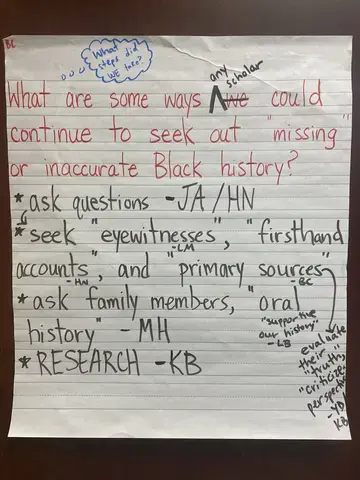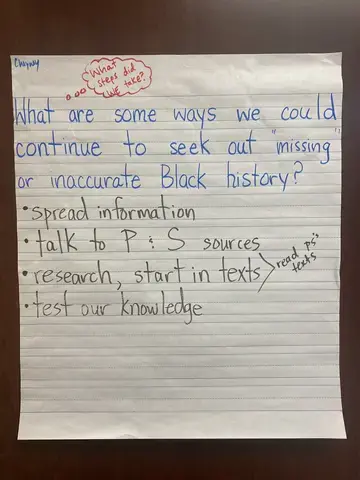This unit was created by Purpose Prep & Promise Land team as part of the 2023 cohort of The 1619 Project Education Network. It is designed for facilitation across three to four weeks
Objectives
Students will approach texts & media with skills that guarantee arguments & perspectives are accompanied with strong rationale, including:
- Annotating text(s)
- Citing evidence
- Small group text-based debate
- Genre study (oral interviews, textbooks)
Students will develop and uphold group work and class discussion norms that will be established and co-revised to value the sharing of multiple perspectives and a dialectical approach to history:
- Everybody speaks: step up, step back.
- Respect others by listening & building upon their opinions.
- Disagree with ideas, not people.
- Build consensus
- [miscellaneous student additions]
Students will build content knowledge regarding the Reconstruction Era and apply skills including defining, chronologizing, summarizing, and critiquing as they engage with nonfiction texts
Students will codify a relatively under-documented local African-American historical site (Promise Land)in the form of textbook chapters by creating a proposed textbook chapter that includes:
- Reconstruction background information
- Primary and secondary source information
- Text feature(s) (e.g. photographs, infographics)
- Author synthesis
Unit Overview
In preparation to teach this unit, during summer pre-service training, Purpose Prep social studies teachers traveled to The Promise Land Community for a history lesson on voting rights from the Smithsonian’s Voices & Votes exhibit. Educators also learned about the legacy of Reconstruction-era Black-founded schools in the South from Promise Land descendant Ms. Serina Gilbert. According to the website from the Promise Land Heritage Association, “ The Promise Land Community was established and settled by former slaves from the Cumberland Furnace during the Reconstruction Period (1870-1875) in Charlotte, Tennessee.”
This unit introduces students to the mission & purpose of The 1619 Project, including the past and current challenges to its teachings in the several U.S. states (specifically, Tennessee). They will self-assess their own understanding of the founding of the United States of America, including examining where, how, and why they hold that knowledge. They will then work to expand their knowledge of U.S. history through analysis of texts centering the experiences of Black Americans and engaging with local research on the experiences of Black Americans throughout history in Tennessee. In collaboration with nearby Reconstruction-era historical site Promise Land, they will codify both primary and secondary source information on the Promise Land school. Students will then present their learnings in the form of a textbook chapter that tells the story of Promise Land accurately contextualizes it within the Reconstruction period, and reflects on processes all students can take to ensure Black history is written, told, and disseminated justly.
Performance Task:
Students will share the story of Promise Land with the intent of educating other upper elementary students by designing their own textbook chapter that synthesizes their research.They will connect their documentation of the story of Promise Land to the mission of The 1619 Project, and the original problem(s) highlighted in journalist Nikita Stewart’s article, “Why Can’t We Teach This?” Students' final projects should include steps for how they would encourage other students their age to conduct research into their local history and ensure it is taught accurately & well.
Assessment/Evaluation:
Students will individually be required to annotate text(s) and cite evidence when working independently, and will chart text evidence and visual summaries during group work
Teacher will review individual student annotations, group charts, and take note of class discussion definitions and ‘must knows’ regarding Reconstruction to synthesize into a study guide that will be shared with students
Teacher will review individual student annotations, group charts, and take note of class discussion definitions and ‘must knows’ regarding Promise Land to synthesize onto an interview script for students to use authentically .
Students’ textbook chapters will be graded with a rubric evaluating the degree to which the following were included in the chapter:
- At least three pieces of Reconstruction period background information
- At least three pieces of secondary source information on Promise Land
- At least three pieces of primary source information on Promise Land
- At least two examples of historical interpretation/author synthesis
- At least one additional text feature
12 lessons implemented over four weeks that include pacing, texts, teaching materials, and multimedia resources. Download below, or scroll down to review key resources included in the unit plan.
Unit Resources
| Resources from The 1619 Project | Why Can’t We Teach This? By Nikita Stewart for The 1619 Project from The New York Times Magazine The 1619 Project from The New York Times Magazine “The Year 1619” infographic from the K-8 Resource from The 1619 Project from The New York Times |
| Additional focus texts | Promise Land Heritage Association website Recording from the Illegal Lesson Teach-In: Promise Land lecture with the Zinn Education Project (2020) (will need to request access) “Erasing the Black Freedom Struggle: How State Standards Fail to Teach the Truth About By Ana Rosado, Gideon Cohn-Postar, and Mimi Eisen” for Zinn Education Project Reconstruction Era African American Schools in the South from the National Park Service “Two States. Eight Textbooks. Two American Stories” by Dana Goldstein for The New York Times (2021) |
| Videos | “How ‘The 1619 Project’ underscores connection between slavery and modern America” interview with Nikole Hannah-Jones for PBS Newshour |
| Teaching Materials | Teacher-created student packet with activities for most lessons [.pdf][.docx] Student-generated example of key details to include when explaining [.pdf][.docx] |
Tennessee 3rd - 5th Social Studies Practices
SSP. 01 Gather information from a variety of primary and secondary sources, including:
- Printed materials (e.g., literary texts, newspapers, political cartoons, autobiographies, speeches, letters, personal journals)
- Graphic representations (e.g., maps, timelines, charts, artwork)
- Artifacts
- Media and technology sources
SSP. 02 Critically examine a primary or secondary source in order to:
- Summarize significant ideas and relevant information
- Distinguish between fact and opinion
- Draw inferences and conclusions
- Recognize author’s purpose, point of view, and reliability
SSP. 03 Organize data from a variety of sources in order to:
- Compare and contrast multiple sources
- Recognize differences between multiple accounts
- Frame appropriate questions for further investigation
SSP. 04 Construct and communicate arguments supported by evidence to:
- Demonstrate and defend an understanding of ideas
- Compare and contrast viewpoints
- Illustrate cause and effect
- Predict likely outcomes
- Devise new outcomes or solutions
SSP.05 Develop historical awareness by:
- Recognizing how and why historical accounts change over time
- Recognizing how past events and issues might have been experienced by the people of that time, with historical context and empathy rather than present-mindedness
- Identify patterns of continuity and change over time, making connections to the present
SSP. 06 Develop geographic awareness by:
- Determining relationships among people, resources, and ideas based on geographic location (local, national, global)
- Determining the use of diverse types of maps based on the purpose
- Analyzing the spatial relationships between people, circumstances, and resources
- Analyzing interaction between humans and the physical environment
- Examining how geographic regions and perceptions of the regions change over time
The following examples present work by fifth grade students in Nashville, TN who engaged with this unit in fall 2023.
1. At the start of the unit, students review an interview with Nikole Hannah-Jones and the homepage of The 1619 Project in order to evaluate the central thesis of the Project. Students collaborate to write the goal of The 1619 Project in their own words.
2. Students also read and annotate the essay, "Why Can't We Teach This?" by Nikita Stewart from The 1619 Project for The New York Times Magazine and ultimately identify one quote that they think captures the central thesis of the article.
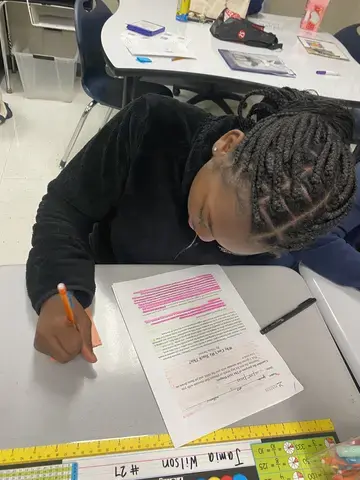

3. Students learn about the history of Reconstruction, analyze the bill TN HB580, compare and contrast the text from the bill and the essay "Why Can't We Teach This?" by Nikita Stewart, and then consider how they think Reconstruction should be taught according to to TN HB580. They then research the history of Promise Land, which was established and settled by former slaves from the Cumberland Furnace during the Reconstruction Period (1870-1875) in Charlotte, Tennessee, and begin planning to share the story of Promise Land with other students in their community by creating a textbook chapter. As part of their research, they speak directly with a descendent from the Promise Land community.
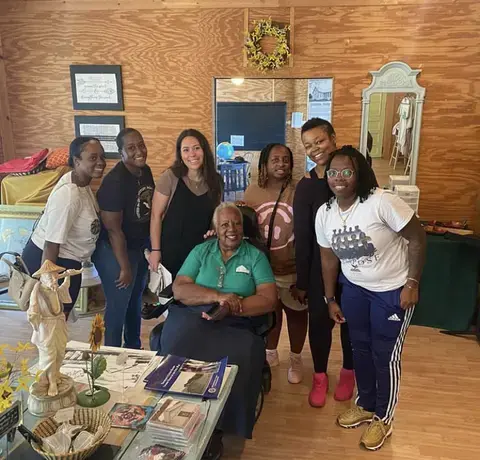
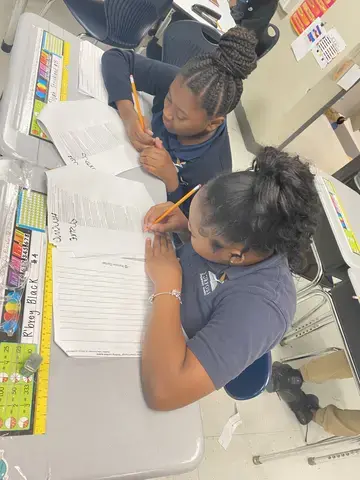
4. Next, students compose textbook chapters for elementary students that describe the history of Promise Land and accurately contextualize it within the Reconstruction period.
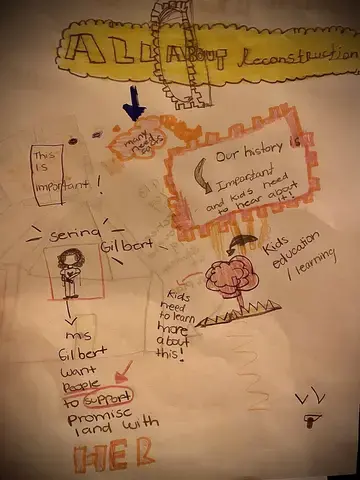
5. At the end of the unit, students reflect on the following prompts:
a. "What are some ways we could continue to seek out missing Black history?”
b. “How did our work connect to The 1619 Project’s goal, ‘to place the consequences of slavery and the contributions of Black Americans at the very center of the story we tell ourselves about who we are as a country... to prepare ourselves for a more just future’ through educating our children?”
